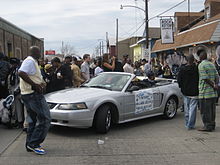Yaka mein
 Yaka mein served in a paper bowl | |
| Alternative names | Old sober |
|---|---|
| Type | Beef noodle soup |
| Place of origin | United States |
| Main ingredients | Stewed beef (brisket), beef broth, spaghetti, hard-boiled egg, green onions |

Yaka mein (Ya-Ka-Mein, often pronounced Yakamee) is a type of beef noodle soup (牛肉麵, Cantonese: ngaw4-yuk4 min6) found in many Creole and Chinese restaurants in New Orleans.
The soup consists of stewed beef (such as brisket) in beef-based broth served on top of noodles and garnished with half a hard-boiled egg and chopped green onions.[1] Cajun or Creole seasoning and chili powder are often added to the broth.
Culture and variations
Yaka mein is sometimes referred to as "Old Sober," as it is commonly prescribed by locals as a cure for hangovers.[2] Vendors are common at New Orleans second lines. (The dish is also now offered in a more commercial setting at the New Orleans Jazz & Heritage Festival, along with many other Creole and Cajun specialties.[1]) The soup is well loved by locals but not well known outside of the city and its surrounding region.[3]
An alternate version, Yat Gaw Mein, is found in Baltimore and Philadelphia carry out restaurants. Yat Gaw Mein consists of thick wheat noodles (similar to udon) in a ketchup-based sauce or brown gravy, accompanied by thickly sliced onions and a hard-boiled egg.[4][self-published source?] Meat, chicken, and seafood can be added, with some restaurants including the option of pigs' feet.[5]
Etymology
The phonetics of yaka mein is similar to the Cantonese pronunciation for "one order of noodles" (一個麵, Cantonese: jat1 go3 min6), a phrase commonly said by small restaurant waitstaffs to their kitchen to prepare an order of the restaurant's house noodle dish. However it is unclear if this is the origin of the name.
This section possibly contains original research. (February 2013) |
The dish is spelled in innumerable ways, all with phonetic similarities. A non-comprehensive list of these spellings includes:
|
|
Origins
The origins of yaka mein are uncertain, and there are at least two propositions:[1]
- Some sources, including New Orleans chef Leah Chase, have claimed that yaka mein originated in New Orleans’s now extinct Chinatown that was established by Chinese immigrants brought from California during the mid 19th century to build the railroads between Houston and New Orleans[1] and work in the sugar plantations of the American South. It was during this period that the Chinese noodle soup adapted to local Creole and Chinese clientele.[6]
- Others believe it was introduced to the US by African American troops who fought in the Korean War and returned with a taste for some of the noodle soup dishes they had in Korea. (This theory appeared on the cooking show Chopped, Season 1 Episode 2: Pride of New Orleans.)
See also
References
- ^ a b c d Roahen, Sara (2008-02-17), Gumbo Tales: Finding My Place at the New Orleans Table, W. W. Norton & Company, ISBN 978-0-393-06167-3
- ^ "Die Chemie des Katers" (in German). ORF. 10 April 2013. Retrieved 27 January 2014.
- ^ McGraw, Dan (2006-02-15), "Turned Up a Notch", Fort Worth Weekly, FW Weekly
- ^ http://foodeyestomach.blogspot.com/2010/06/baltimore-yat-gaw-mein.html [self-published source]
- ^ "Dining@Large: Pigs' feet fusion - Baltimore restaurants: The dish on the restaurant scene, memorable meals, dining trends and more - baltimoresun.com". Retrieved 1 January 2015.
- ^ spchef (2009-06-01), Leah Chase on the Chinese in New Orleans and "Yaka Mein"
